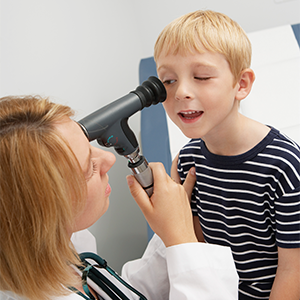Once the summer comes to an end, many parents occupy themselves getting
their kids ready for school by organizing their backpacks. However, no
amount of new pens and notebooks can help your child succeed in school if
they have undetected vision-related problems. Many children struggle with
vision problems without even realizing they have them. Proper eye care is
instrumental in a children to learn and to achieve their academic
potential, as well as participate better in extracurricular activities.
A Comprehensive Eye Exam Matters
Typically, your children should first get his or her eyes examined at 6
months old, as this is when their vision sharpens. You want to make sure
that your kid’s eyes are developing normally and are working together.
Getting your kid’s eyes examined sooner will reduce eyesight problems like
blurry vision. Children’s eye exams can detect nearsightedness,
farsightedness and astigmatism that can be easily treated with prescription
glasses. Your doctor can also spot a condition known as “lazy eye” that
occurs at a very early stage in a child’s life.
Here are the six basic skills involved in promoting good eyesight for
learning and reading well:
-
- Visual Acuity
Visual acuity is also known as 20/20 vision. It means you are clearly able
to see what is 20 feet away. It also means being able to perfectly see
what’s written on a chalkboard, as well as the small print on a computer
screen or the text in a book.
-
- Eye Focusing
Eye focusing involves the ability to promptly and accurately maintain clear
vision when the distance from objects changes. One example is from looking
at a projector screen to inside your notebook. Eye focusing will allow your
child to comfortably maintain clear vision when reading a book or while
writing an essay.
-
- Eye Tracking
Eye tracking is the ability to visually follow a moving target or switch
attention from one object to another. It could include moving your eyes
along a printed page or watching a moving object like a bouncing ball.
-
- Eye Teaming
Eye teaming permits both eyes to work together in an accurate and
synchronized way. It permits comfortable vision and lays the foundation for
depth perception. It makes reading, writing and copying simpler tasks.
-
- Eye-Hand Coordination
Eye-hand coordination is an important skill in being able to perform
activities that require the synchronized use of your eyes and hands. It
requires us to unite our visual and motor skills. Eye-hand coordination is
key to allowing normal child development and academic success.
- Visual Perception
Visual perception allows us to process and make sense out of the visual
information we take in through our eyes. It’s an important skill for
everyday activities such as reading, writing, solving puzzles, cutting and
drawing.
Common Symptoms in Children With Vision Problems:
Children with vision problems often do not tell their teachers or parents
about their vision problems, probably because they don’t even realize they
have them. Some symptoms may include:
- Finishing schoolwork slower than usual
- Constant headaches
- Habit of covering one eye
- Frequent blinking
- Shorter attention span
- Constant fidgeting and looking away from work
Benefits of an Early Eye Exam
Good eyesight is a must. Kids may not be expressive about their complaints,
not realizing how bad their eyesight is. The only way to tell if a child’s
eyesight is normal is for you to take him or her for an eye exam. Here are
some benefits of getting your child’s eyes examined.
-
- Eye Issues Can Be Fixed at An Early Stage
Eye issues like a lazy eye can be fixed at an early stage.
-
- Eyesight is An Indicator of Overall Health
Good eyesight is a barometer of overall health and can start showing signs
when something goes wrong. For instance, cataracts in children may indicate
the presence of diabetes.
-
Excellent Vision Improves Academic and Sports Performance
Strong vision improves achievement in both academics and sports, since it
will ensure that your child is progressing at the same rate as his or her
peers. Good eyesight can also be achieved with the help of prescription
glasses.
-
- Your Child May Be Allergic
If your child often complains about red, itchy eyes, then your child may
also be suffering from seasonal allergies. Over-the-counter allergy
medicines may or may not work for your child, so, you might consider taking
your child to your eye doctor as well.
Scheduling an eye test for your children will
reduce vision problems by giving you a better picture of
their eye health and an opportunity to remedy any pre-existing conditions.
As a result, they will perform better in classroom activities and your
children will be ready for the next big game!



